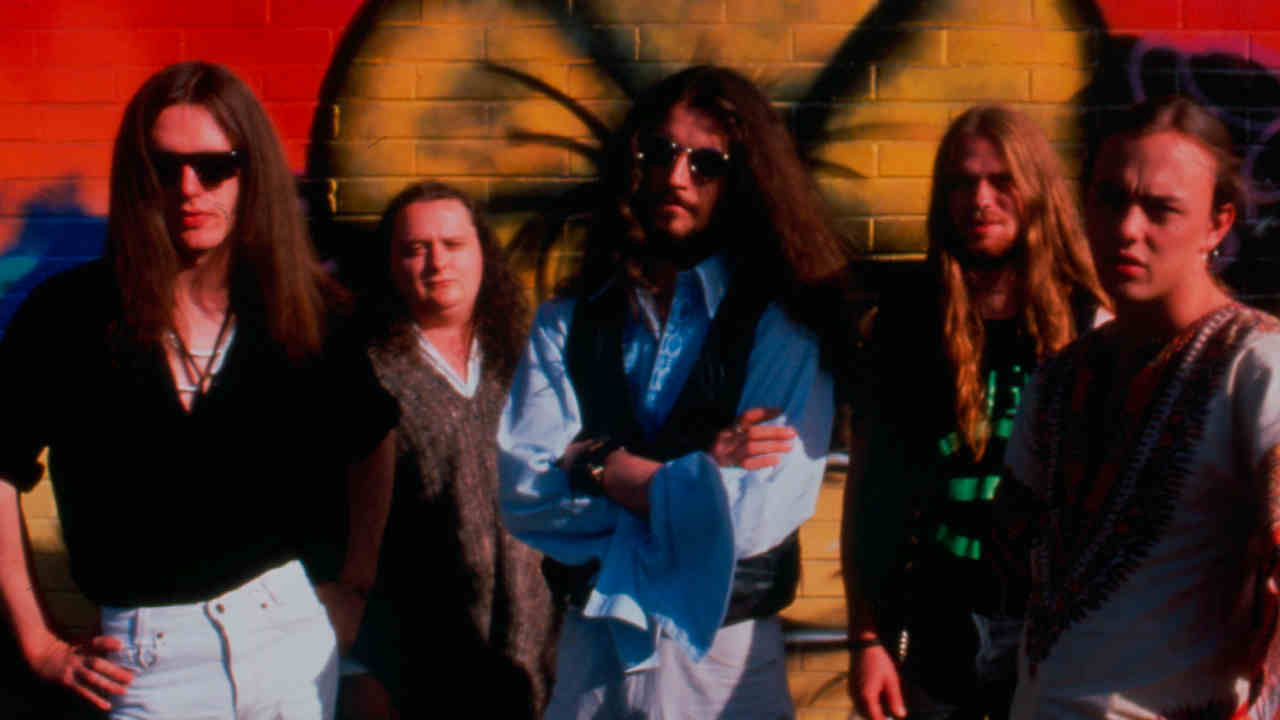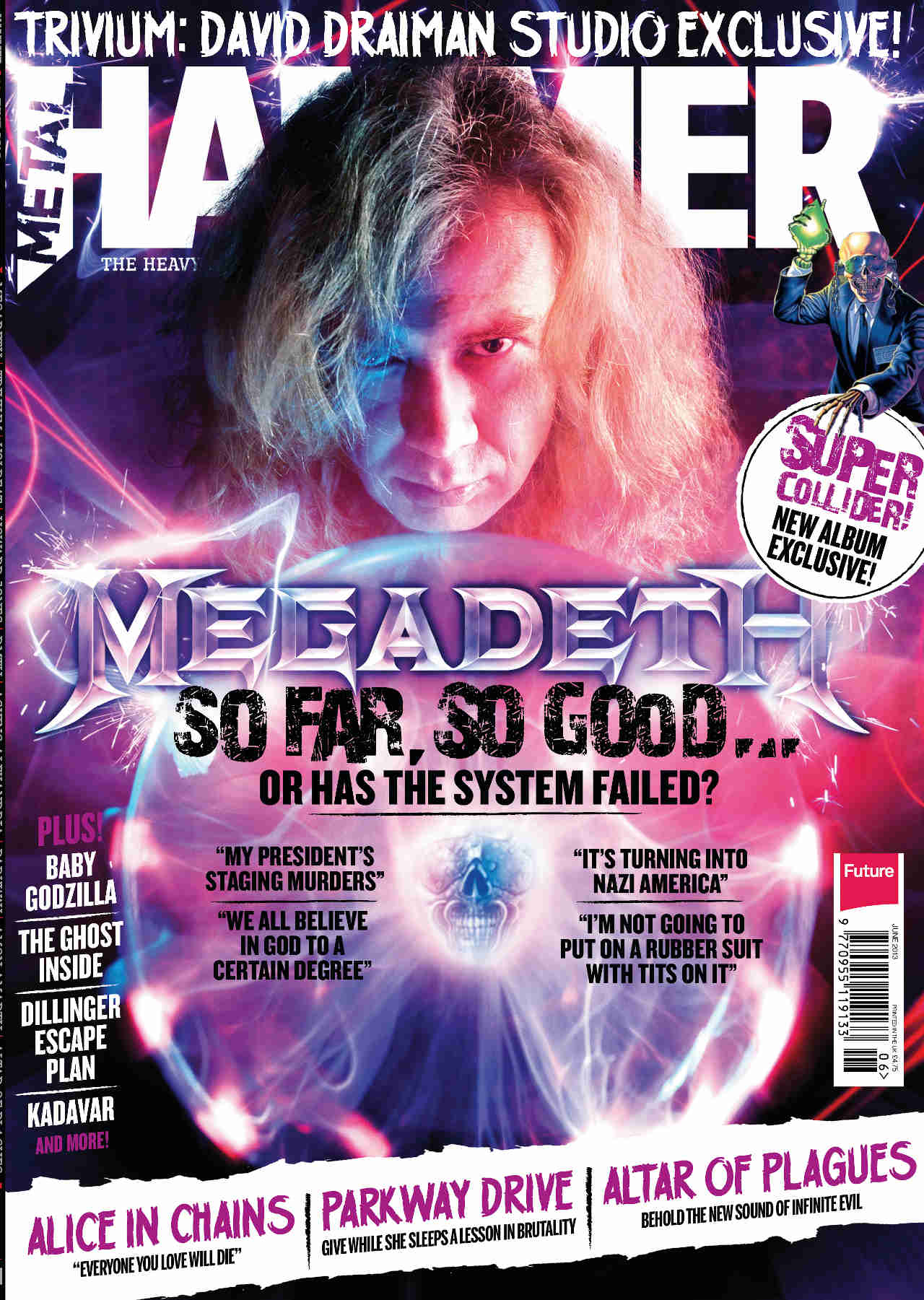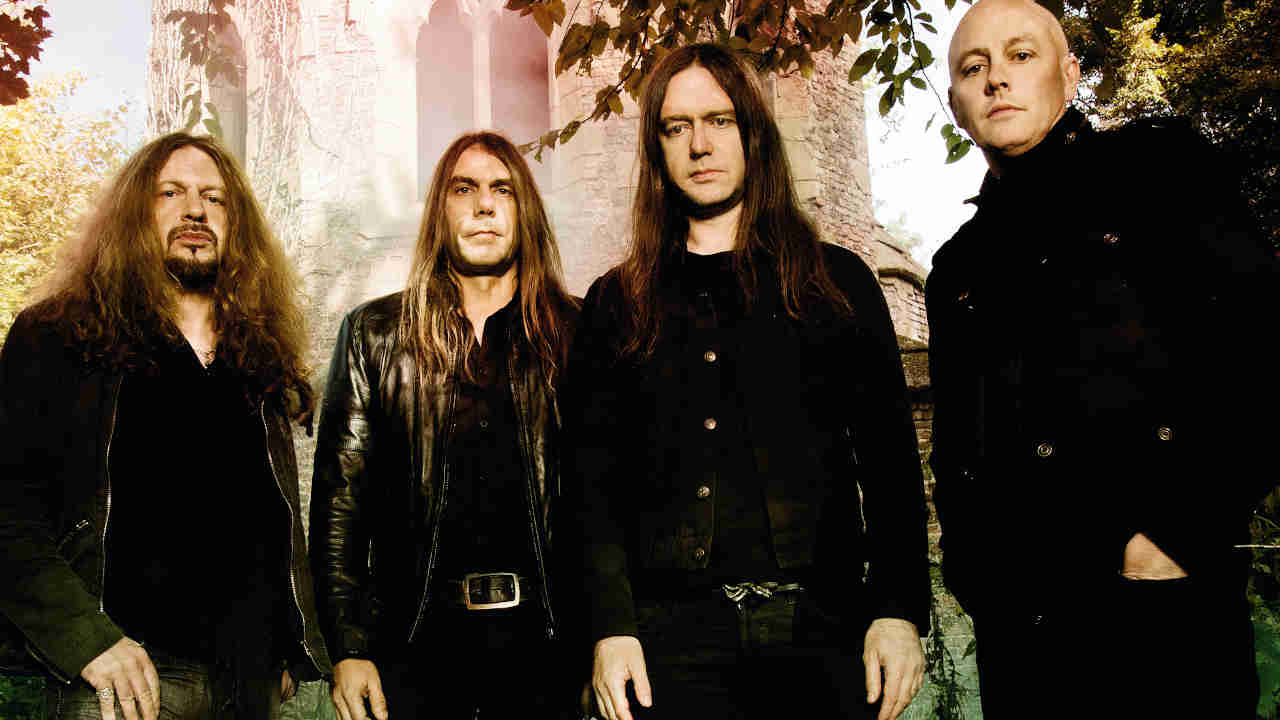Formed in 1989 by ex-Napalm Death vocalist Lee Dorrian, Cathedral were one of the longest-running and most influential doom metal bands of the last 40 years Although they split in 2013 following swansong album The Last Spire, their legacy still runs deep. As the band prepared to wind things up for the final time, Dorrian looked back over the smoke-wreathed career of a band who helped keep the doom flag flying.

During the 80s, doom metal was in a fractured state and barely a ‘scene’ at all. Candlemass and Trouble enjoyed some mainstream success, but others – including the likes of Pentagram, Witchfinder General and Saint Vitus – existed in their own little bubbles, starved of support and exposure. Their fans, however, although scattered and few in number, were extremely dedicated, and it took just one of them – Lee Dorrian himself – to help set the stage for doom to develop into the thriving underground movement it is today.
Disillusioned with Napalm Death’s changing musical direction and with the media circus which surrounded them during their first flush of success, Lee set Cathedral in motion following a drunken conversation with fellow doom fan Mark ‘Griff’ Griffiths. The pair hooked up with ex-Acid Reign guitarist Garry ‘Gaz’ Jennings – also a closet doom freak – and began working on material, determined to create the heaviest doom metal possible.
After demoing some painfully slow songs which Lee describes as “one chord a minute”, the band added Gaz’s former Acid Reign bandmate Adam Lehan on second guitar, fleshing out the sound and style which shaped their 1991 debut album, Forest Of Equilibrium. With chops honed following tours with the likes of Paradise Lost, Morbid Angel and The Young Gods, Cathedral hit the studio fully focused and raring to go, and Forest Of Equilibrium remains both a fearsome slab of doom and arguably the band’s definitive album.
“There are albums that are better produced or maybe have better songs,” says Lee, “but I think it’s the most focused album we’ve ever done. It captures a moment in time when we were doing everything against the grain and I think it’s the best.”
The arrival of drummer Mark Wharton – also ex-Acid Reign – and 1992’s Soul Sacrifice EP heralded a shift in style which pointed the way towards future developments.
“Gaz and Adam’s writing style advanced really quickly,” Lee explains. “From writing really doomy, droney stuff, they were coming up with more complex ideas. It was a real turning point, although I didn’t actually want the band to change. As much as I didn’t want us to feel restricted, I didn’t want the songs to become too bouncy. I hated that word! A song like Autumn Twilight is quite bouncy and it took me a while to be convinced this was the direction we should be going in, but I went with it and in the end felt it was a good move forward.”

The changes on Soul Sacrifice, however, prepared no one for the enormous leap taken with the band’s second album, 1993’s The Ethereal Mirror. Cathedral had just found themselves on major label Columbia Record in the US due to a deal made by their label Earache, and were under severe pressure to deliver. It was a big break for which they were desperately unprepared, in more ways than one.

“If we were gonna release a record on one of the world’s biggest major labels, they were gonna want it to sound good,” Lee recalls, “whatever your definition of ‘good’ is. They were gonna want it to have a wider appeal than Forest… did, even though they said they wouldn’t have minded if we’d done an album like that but with better production, which was kinda missing the point. So this meant big studio, big producer and all that went with that. So we went from being in a basement with a friend of ours helping us out to Manor Studios where [Mike Oldfield’s 70s prog classic] Tubular Bells and [the Sex Pistols’] Never Mind The Bollocks were recorded. The producer was saying, ‘You guys suck! You can’t play!’ I don’t know if that was a tactic to get us to perform better, but the songs just weren’t ready when we went to the studio. But somehow we managed to pull it out of the bag. All things considered, it’s amazing it turned out the way it did.”
Despite the stresses of the studio and the fact that, in private, the band weren’t particularly happy with the album, The Ethereal Mirror was a success. In the ensuing whirlwind of touring and promotion, however, trouble was brewing.
“We were put on tours that we didn’t really wanna do,” explains Lee. “It caused disillusion within the band and we started drifting apart. It was sad, because we’d got that far doing it on our own terms. Slowly the cracks started to show. Griff was the first to leave, then Adam. To me, they were both vital parts. Eventually the whole thing imploded and Columbia dropped us. It was just me and Gaz left.”
There then followed a period which Lee looks back on as “bewildered and confused”, during which he and Gaz struggled to meet the band’s commitments, enlisting a string of hired hands just to make it through.
Eventually, however, after much frustration, they recruited bassist Leo Smee and drummer Brian Dixon, both of whom went on to become longtime members. Wary of losing any more momentum, the band then hit the studio to record their third album, 1995’s The Carnival Bizarre.
“We had a new lease of life. Recording that album was great fun,” says Lee. “It’s got great energy and the vibe is what makes it.”
Like its predecessor, Carnival… received rave reviews which inevitably led to a heavy touring schedule. So heavy, in fact, that it left the band little time to prepare their next record. The pressure was so intense that, expected to come up with an album’s worth of lyrics in one week, Lee quit the band. Or tried to, at least.
“I just said, ‘Fuck this, I’m out of here!’ I was dead serious, but the rest of the band carried on, ignored me, and got ready for the studio!”
Although Lee soon changed his mind, the studio sessions for 1996’s Supernatural Birth Machine were at times far from fun.
“There isn’t a single song on the album that I rehearsed even once,” groans Lee. “Most of them are first takes and a lot of the lyrics were written 10 minutes before they were recorded. It was hideous. Because there was a two-year gap between Ethereal… and Carnival…, we felt we had a lot of time to catch up on. We’d decided that no matter what the situation, we’d do an album a year after Carnival…, which was stupid. We were nowhere near prepared to record it, which was a shame.”
Haunted by this, they were in no rush to head back to the studio which, ironically, presented them with the opposite problem when they did eventually return in 1998 to record Caravan Beyond Redemption.
“I think we actually spent too much time on Caravan…!” laughs Lee. “We tried too many different things that, on reflection, weren’t really cohesive enough.”
The album also highlighted just how far Cathedral had moved beyond their early sound, a situation Lee in particular was weary of.

“I was getting disillusioned”, he admits. “I thought we were drifting away from real heaviness. The songs were starting to sound too polished and I was starting to have bust-ups with the other guys. So I said, ‘If we don’t make this next album the heaviest we’ve ever made, I’m gonna fucking think seriously about leaving the band. Again.’ At first they didn’t agree with me, but eventually they came round to my way of thinking, and that’s what led to Endtyme. In a way, it completely destroyed everything we’d done up to that point. It was almost like staring over again.”
Released in 2001, Endtyme dragged the band back to their roots, but it didn’t last long.
“I thought Endtyme would be a turning point where we went back to being a completely heavy band,” says Lee, “but with The VIIth Coming it kinda slipped back to where it had been with the album before. But to be honest, I’d kicked up such a storm and got my way with Endtyme, I just kept my mouth shut. I didn’t wanna seem to be like I was bullying everyone into doing something they didn’t wanna do.”
The long gap between The VIIth Coming and 2005’s The Garden Of Unearthly Delights was down to a number of things, chief among which was the very question of the band’s existence.
“We were working out if we wanted to do this anymore,” explains Lee. “The signs of the band coming to an end started back then. I wasn’t tired of being in a band; I was tired of fighting to be in a band. We really believed in it but every-thing seemed to be a struggle. So we went and did a bit of soul searching.”
Souls duly searched, Cathedral finally returned in 2010 with The Guessing Game, a sprawling double album and their most adventurous yet. Although not the last Cathedral album, as some – including the band themselves – initially imagined, even the possibility seemed to take the pressure off and open the creative floodgates. Progressive and eclectic, it was a fine achievement and would have made a fitting epitaph. During the ensuing tour, however, old wounds re-opened.
“The usual problems were still there,” says Lee “The old signs were starting to show. If everyone was in it 100 per cent and for the same reasons, we’d still be here now. It just got to the point where I didn’t have the time, the energy or the fight to do this anymore. I told Gaz and he basically agreed.”
Once the decision to split had been taken, the band embarked on a series of farewell shows, including a date in London which was recorded for the 2011 live album Anniversary. Touring decks thus cleared, they then began work on the final Cathedral album, The Last Spire. Huge, crushing and heavier than hell, it’s the sound of a band with nothing left to prove.
“It’s relentless, flat-out doom!” smiles Lee. “It’s almost like we’ve recorded our second album last.”
Few bands have done as much as Cathedral to shape the development of doom. From songs you can dance to, to songs that make you want to slit your wrists, their music is colourful even when it’s pitch black, and always inventive. If there is such a thing as a perfect ending, maybe this is it.
“We really had to get this right,” Lee concludes. “The way we ended the band was almost as important as the way we started.”
Originally published in Metal Hammer 244, April 2013

